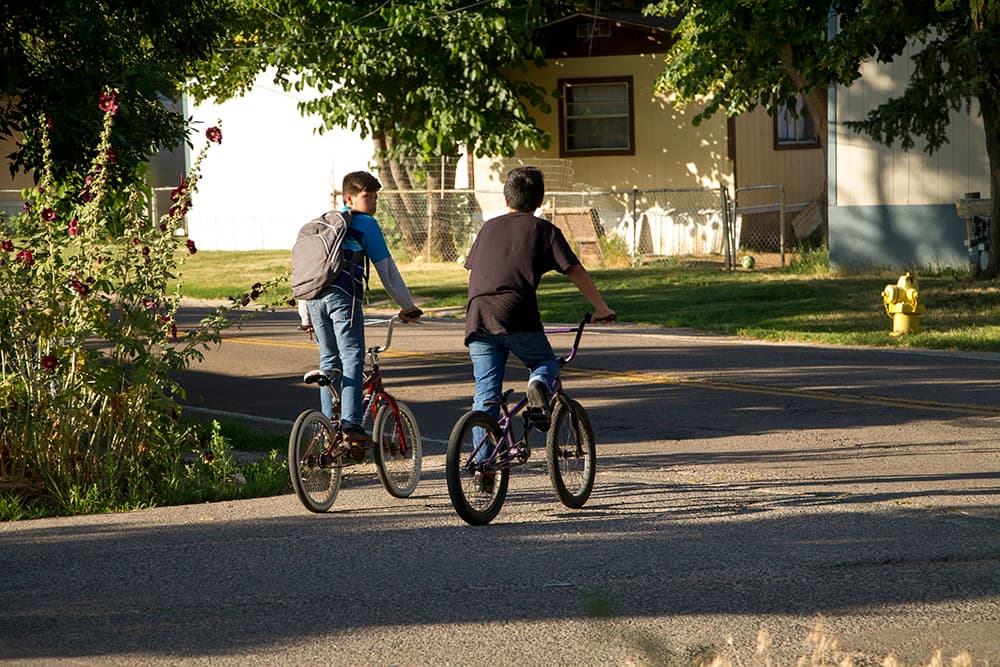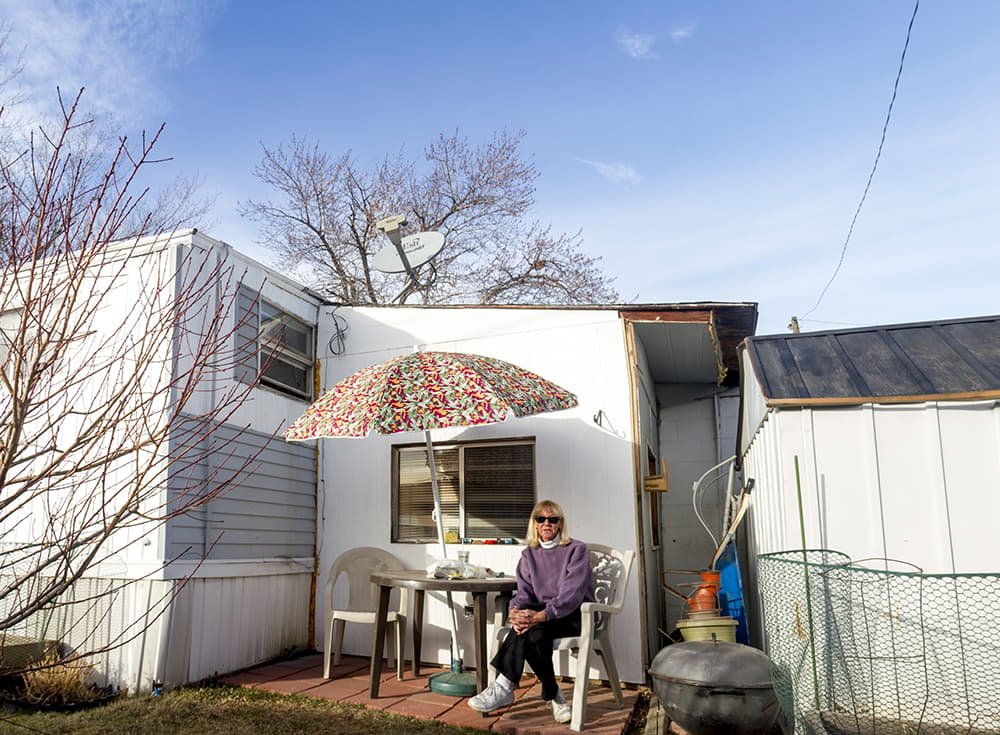
Hotels, mid-rise apartment buildings and offices are going up around the Denver Meadows mobile home park. On the other side of the recently opened R Line, the University of Colorado Anschutz Medical Center is dotted with cranes as the hospital expands. Everything is shiny and new, except the mobile home park.
Aurora’s Colfax and 13th Avenue Station Area Plan identifies the park property as an ideal place for transit-oriented development. Last year, the residents of this park organized to beat back an attempt by the owner to rezone it. Now, the park ownership says it will simply close down the park.
"We might sell it. We might redevelop. We don't know," owner Shawn Lustigman said in a recent interview. In the meantime, residents describe a campaign of harassment from the management that they think is intended to empty out the park sooner rather than later.
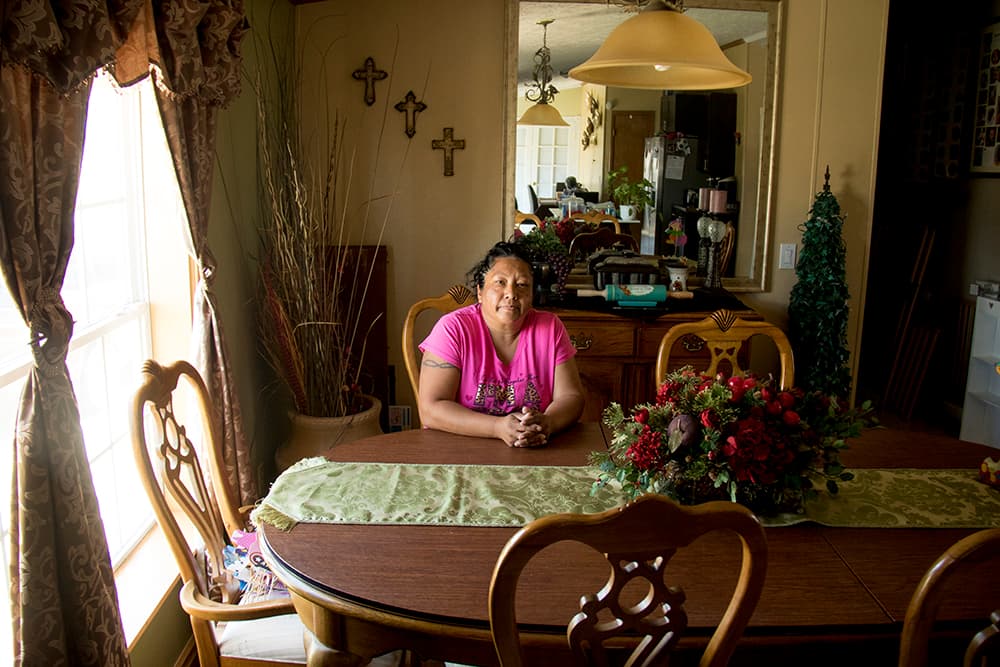
“This is the only place that doesn’t really accord with what they want to do,” said Ana Tovar, who bought her home in Denver Meadows seven years ago. “Maybe this would be a good place for the city (to redevelop), but for us as residents, it’s a good place to live.”
The fate of Denver Meadows in Aurora could be the fate of dozens of mobile home parks in the metro area.
“This is a primary way that low-income people can break into the homeownership market,” said Esther Sullivan, a professor of sociology at the University of Colorado Denver who has lived in and studied mobile home parks. “It’s not only for the middle class."
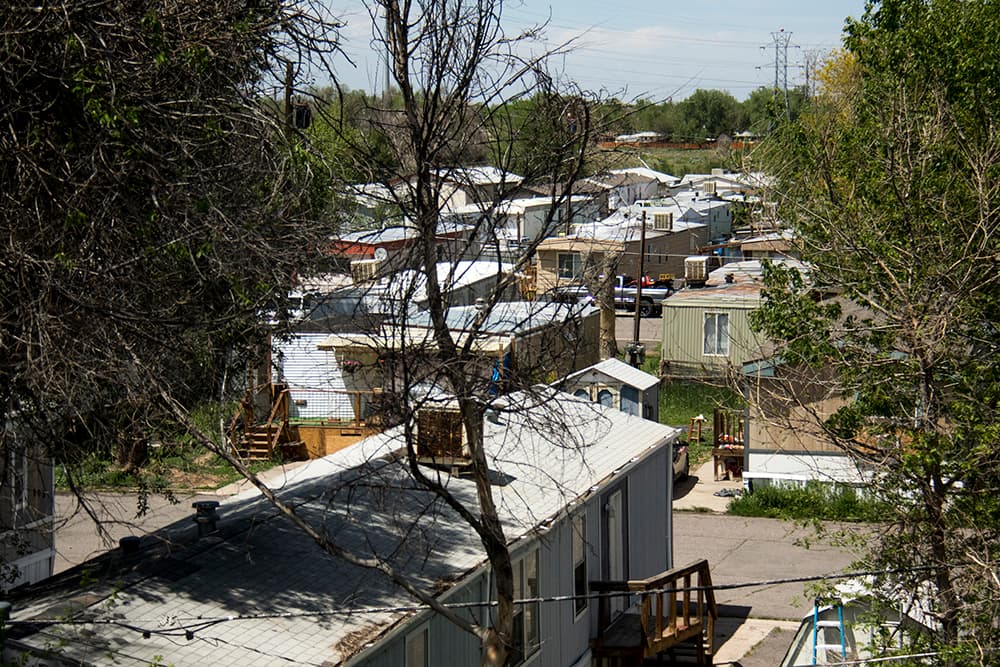
Once situated on the outskirts of cities, many mobile home parks are now on key transit corridors -- right where cities want to see denser development. Land prices are rising, and many of the individual homes are older and in disrepair. Denver has land use policies that actively discourage the preservation of mobile home parks, and many jurisdictions just don’t have policies at all.
“They would love to see this become seven to 10 stories with apartments and shops underneath,” said Sharon Whitehair, who lives in the Pioneer Village mobile home park off of Federal Boulevard in Adams County. A 2014 Federal Boulevard Framework Plan adopted by Adams County doesn't actually rezone any property, but it does describe just that sort of mixed-use, transit-oriented project as the preferred type of development along Federal Boulevard.
Many of the residents of these parks own their homes and have invested tens of thousands of dollars in them, but they don’t own the land on which their homes sit, instead paying lot rent to park owners. They don't benefit from the appreciation that other homeowners have seen. They're vulnerable to the whims of landlords, and despite the "mobile" in the name, they have less ability to pick up and move than other renters.
Tovar said she called dozens of parks, and the only place with room for her double-wide is in Colorado Springs. Another resident of Denver Meadows ended up in Kiowa. When Tovar got a quote to move her trailer, she was told it would be $25,000 when the mileage was included and that she would have a week to come up with the money.
A mobile home made Whitehair's life possible.
Whitehair was a recently divorced single mother of two young boys when she moved into Pioneer Village. She was cleaning houses, mowing lawns, doing any kind of work she could find, and taking in maybe $14,000 a year. Before some friends bought the mobile home for her, she was bouncing between the couches of two different friends with her boys.
The lot rent back in 1998 was $280 a month. “That was just about the only housing I could afford,” she said.
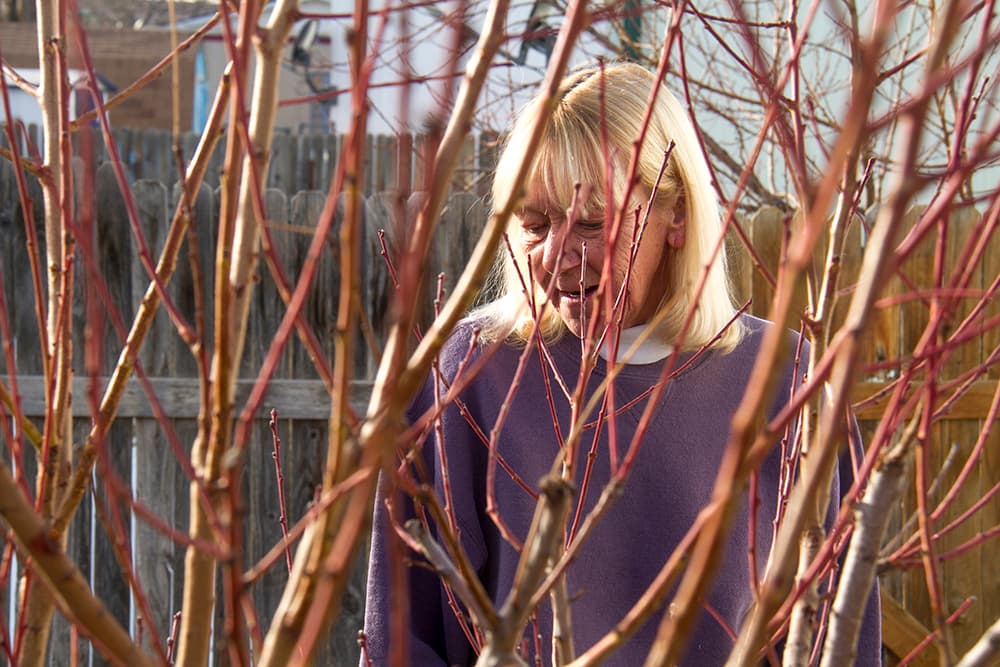
From that base, Whitehair could raise her boys in a safe community where they could play outside, and she could put herself through school. Now that she’s a district manager with the Berkeley Water and Sanitation District earning roughly $60,000 a year, the cheap rent -- still just $560 a month -- means she can throw a ton of money at the student loan debt she racked up at a later age than most people.
In her mobile home, Whitehair got to enjoy the amenities and the privacy that make single-family homeownership the ideal to which so many Americans aspire.
“The yard itself is really special," she said. "My yard was immaculate. I could put whatever kind of flowers or hanging baskets or arrangements I wanted. And I had my little garden for my vegetables. With an apartment, you're lucky if you get a balcony.”
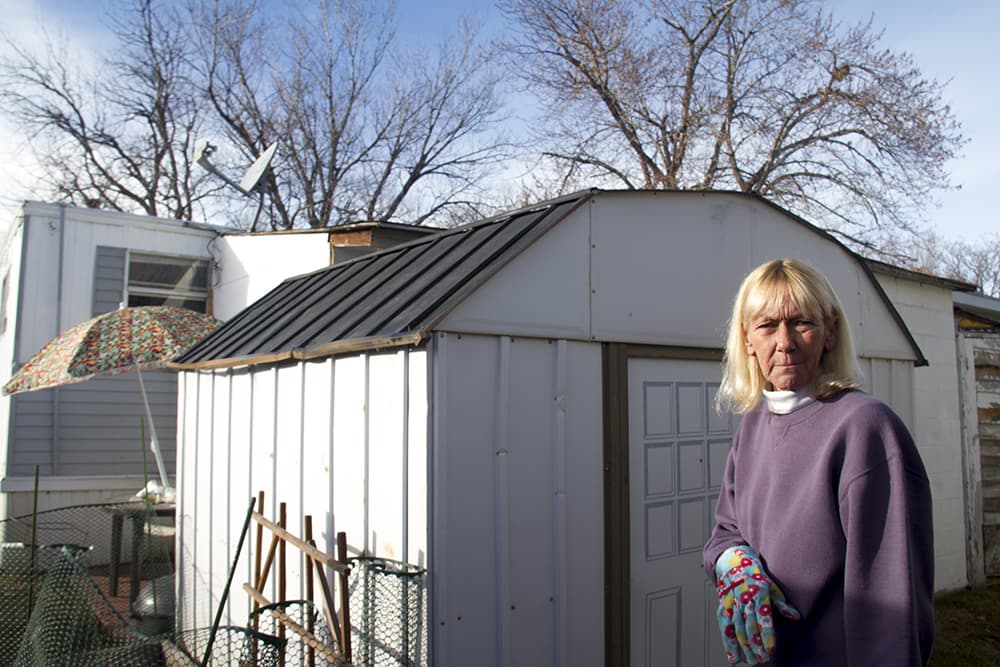
Whitehair was part of a group of residents organizing to try to buy the park for themselves when it was sold to a national company that owns and manages mobile home parks around the country. The new owner installed water meters on each unit, and the rates are higher than those charged by the local water district. More significantly, the change underscored the fundamental insecurity of the residents' position. She'd like to see state law change to give residents first right of refusal when parks are sold.
When Denver shut down the park where Maria Ceballos lived, she went looking for another mobile home park.
Ceballos moved into the Belmont park in Denver's Westwood neighborhood after living in a series of apartments where there were constant problems with maintenance and cleanliness. But not long after she arrived, Denver closed down both Belmont and the Shady Nook trailer park because there were extensive safety issues, including problems with the gas and electric lines.
St. Charles Town Company bought the land with the help of a loan from the city and is building 197 affordable apartment units in seven buildings on the 4.5-acre site at 4400 Morrison Road. The community will have amenities like a fitness center, vegetable gardens and car-sharing services. Units will be reserved for those making 60 percent or less of area median income (up to $33,660 for a one-person household and up to $43,260 for a family of three). Former residents will get right of first refusal on these units, but Ceballos has no interest.
“There are always problems,” she said of apartment living. “They never maintain the property. I like this type of life. Why look for another place?”
St. Charles and the city of Denver provided relocation assistance to every displaced family, and Ceballos ultimately was happy with her settlement. She got $30,000 toward a new trailer, and she has moved to Berkeley Village in Adams County.
“It’s much better,” she said. “We have so much more space.”
Ceballos pays $750 in lot rent for a three-bedroom trailer she shares with her partner and three of her children. Meanwhile, one of her adult sons pays $1,400 a month for a two-bedroom apartment he shares with his partner and their baby. Ceballos is a home health care aide, and her partner works in landscaping. She feels like they can meet their needs, despite relatively low-paying jobs, while her son is stretched.
Sullivan said mobile home owners often have strong feelings about their lifestyle. "We're just not apartment people," was something she heard more than once during her research.
"It's a house," emphasized Liliana Peña, who lives in Denver Meadows with her young daughter, as boys zipped around the quiet streets on their bikes.
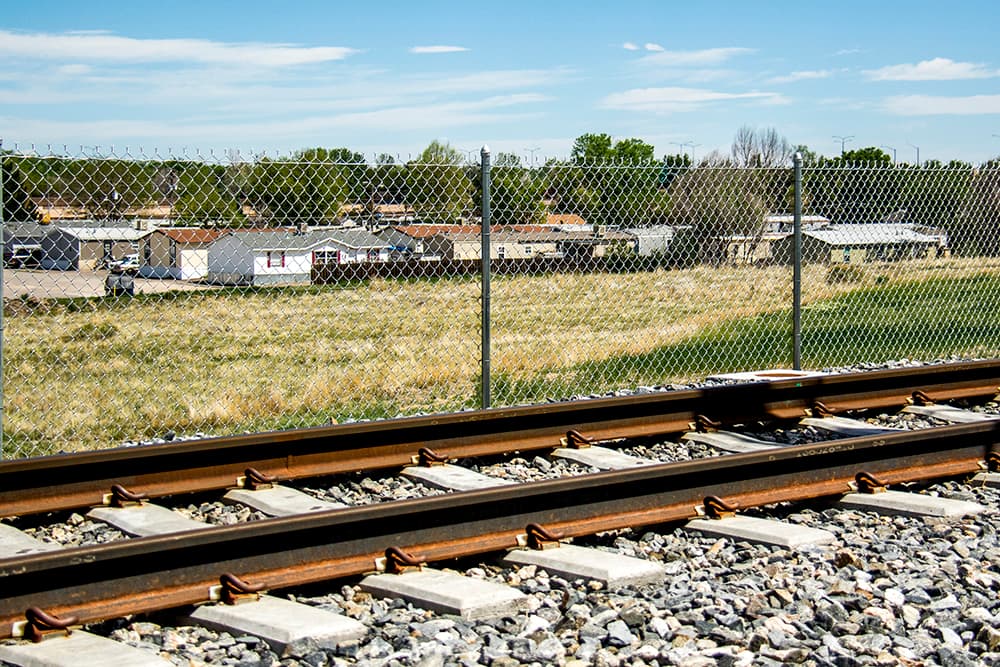
Denver actively discourages mobile home parks within its boundaries.
Trailer parks are officially a non-conforming use in Denver, and park owners can't add new homes or replace old ones. City officials aren’t entirely sure how many parks are left in the city, but it’s somewhere in the single digits.
Denver Zoning Administrator Tina Axelrad said that even in 1956, when the zoning code first addressed mobile home parks, they were discouraged. Most of the parks in Denver got that way through annexations and are part of what Axelrad calls “a county land-use pattern” that isn’t appropriate in a more urban area.
The issue isn’t the housing itself -- the zoning code doesn’t really distinguish between manufactured housing and site-built housing -- but the layout of the parks, with small homes close together on narrow streets that are challenging for emergency vehicles to navigate, Axelrad said.
So city policy has been that mobile home parks would go away over time. The city codified what had been an unspoken policy in 2014 at the same time officials were debating the fate of Belmont and Shady Nook.
“The people of the districts where most of these (parks) are felt that, weighing out the pros and cons, they would rather see the land turned over with public support into something better in their eyes and of a quality that was more beneficial to their community,” Axelrad said.
Councilman Paul Lopez, who represents Denver's west side, has repeatedly denounced the use of the word "gentrification" to describe the Del Corazon project being developed by St. Charles Town Company because it's designed specifically for the very low-income residents who were displaced. And it will provide new, safe housing with amenities where before there was dilapidated, unsafe housing.
But Andrea Chiriboga-Flor, an organizer with Colorado 9 to 5 who worked with residents in Belmont and Shady Nook and now with residents of Denver Meadows, said this redevelopment inevitably leads to displacement and the rupture of existing communities. A representative of St. Charles Town Company described the relocations as "a very private and sensitive process" about which the company did not want to answer specific questions. However, all of the residents are in much higher quality housing now, he said.
Chiriboga-Flor said that may be the case, but only two of the former residents still live in Denver. The rest are in Thornton, Commerce City and further afield. Residents of Denver Meadows are finding themselves similarly dispersed.
"If you think this is important, to preserve one of the last affordable housing spaces in Aurora that doesn’t require a subsidy, then work with us,” she said of Denver Meadows. "We’ve been seeing displacement, displacement, displacement as the only option. That’s bullshit."

Boulder takes the opposite approach with a zoning policy that protects mobile home parks.
Mobile home parks provide some of the last affordable housing in one of the most expensive cities in the Front Range, and land values are so high that owners would have a big incentive to sell if these sites could be rezoned. For that reason, Boulder has adopted a policy of not rezoning mobile home parks. And the city actually bought one mobile home park in central Boulder, the Mapleton Mobile Home Park, and converted it to a resident-managed community owned by Thistle Communities, a developer and manager of affordable housing. Boulder is poised to buy and annex another park on the city's northern edge, the Ponderosa Mobile Home Park.
The purchase of Mapleton came about because the city needed some of the land for a flood control project. The city then turned the land over to Thistle because it didn't want to be in the park management business. Rather than redevelop the property as some other sort of affordable housing, it has remained a mobile home park.
"It’s just an incredible location," said Mary Duvall, executive director of Thistle. "It’s right in the heart of Boulder. It’s permanently affordable. They have an opportunity to own an affordable home in perpetuity, which is really important. It’s self-governed for the most part. The board is democratically elected. They work really hard to meet the needs of residents and make sure the park is fiduciarily responsible. They cover all their own costs."
In contrast, when Boulder Housing Partners, the city's housing authority, redeveloped the dilapidated Mobile Manor park into brightly colored, energy-efficient single-family homes, only about a third of the 59 households who used to live there were able to move back. Some had settled into new lives in other places during construction, and others had family members who were undocumented. If anyone in the household doesn't have the right paperwork to be in the United States, that family can't live in housing that was subsidized by federal money.
In Adams County, north of Denver, there are roughly 11,000 mobile homes in more than 70 parks.
Back in 2000, there were more than 13,000 units, and mobile homes made up 10 percent of the housing stock. Now it's just 7 percent. The Balanced Housing Plan from 2009 singles out this option as important to maintaining affordable housing in the county.
At the same time, the study noted that many mobile homes are in poor condition, and the split ownership undermines the ability of mobile home residents to build equity. A more recent study quoted several local officials as saying mobile home parks don't provide the amenities or the connectivity that the county wants to see from its residential areas.
Norman Wright, director of Community and Economic Development for Adams County, said the county is in the midst of developing a new "holistic" housing policy, but hasn't decided how to treat mobile home parks.
"There are several hundred units of affordable housing that we’ve been a partner in creating, and we realized that even as we were creating this affordable housing, there was greater need that we might not be able to fill for people who are displaced," he said. "This is a strong real estate market, and there are people who are going to see the opportunity to redevelop these areas. We could lose quite a bit of housing if we don’t develop a policy."
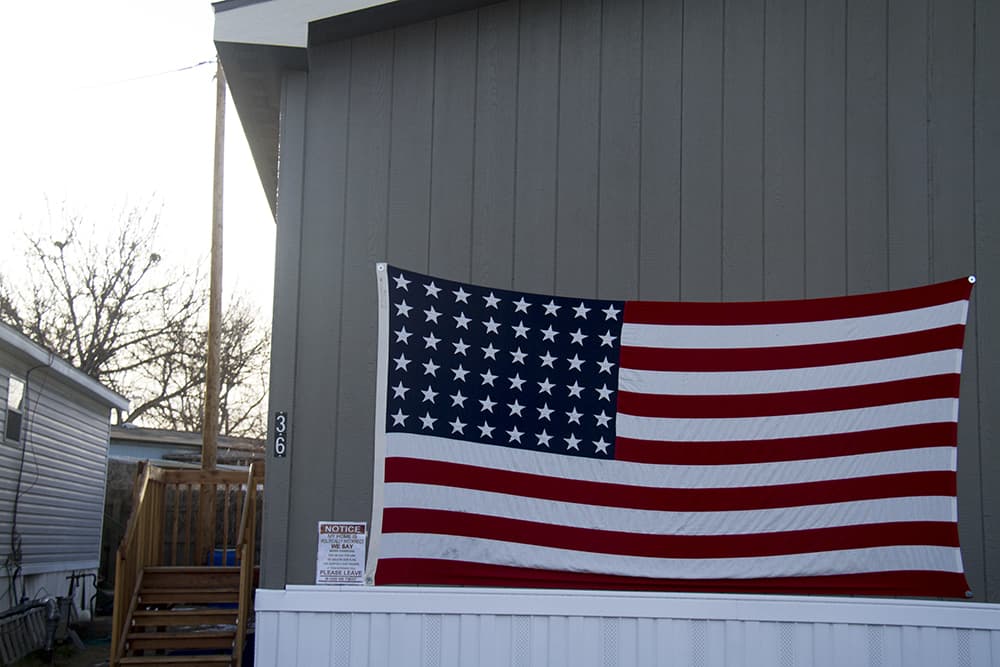
At the same time, Wright stands behind the Federal Boulevard corridor plan that would support rezonings and redevelopment. There are a lot of competing interests and values involved in land-use policy.
"It's a great vision for this part of our community, and it’s a dynamic vision that shows this boulevard becoming much more than it has been, that promotes all manner of activity," he said.
Erin Mooney, a community organizer with Cultivando, which has been working in mobile home parks in Adams County, said the county should impose a two-year moratorium on rezoning of mobile home parks until it can get a handle on the right approach.
"There is a lot of well-founded fear around displacement," she said. "Adams County has experienced an influx of people. We get folks moving from Denver and putting pressures on our housing market as well as the normal pressures. ... Mobile home parks really do play an important role, and for some families, it is the only opportunity they have for affordable housing."
Whitehair wants local and state officials to contrast mobile home parks with the subsidies they have to provide to get developers to build new affordable housing. This is perhaps even more important now that tax-credit financing is harder to come by.
"Here, if you allow us to create a resident-owned community and allow us to build equity, it's the reverse of that," she said. "None of this is subsidized housing."
Resident ownership is the ultimate goal for community activists.
ROC stands for Resident-Owned Communities, and ROC USA helps mobile home owners buy the parks in which they live. The lot rents they've been paying to landlords become the mortgage payments on their share of the land. In many cases, the payments remain the same or even go down, and money that previously was profit for landlords is invested in infrastructure upgrades. ROC has a capital arm that provides low-interest loans, but the organization will also connect park residents to other financing if it can be had at a lower rate. In Washington and New York states, the state itself will provide low-cost financing for these park conversions as part of its affordable housing programs. The organization recently started operating in Colorado.
Mike Bullard, a spokesman for ROC USA, said this model gives park residents the security that other homeowners have always enjoyed.
"Providing the land ownership is like completing the American Dream," he said. "It provides the security of owning a home and living there as long as you want. There is no fear of unfair evictions. That secure home is the first big step in terms of asset-building and wealth-building. Now it's safe to make improvements in my own home and in my yard. People who don't live on leased land take that for granted."
In Denver Meadows, residents see a link between how they're treated by the landlord and development pressures.
Last year, park residents turned up at city meetings, and the rezoning was tabled by Aurora City Council members concerned that there was no clear plan for what would happen to the residents. If the redevelopment project used federal funds, it would trigger relocation requirements similar to what happened with Belmont and Shady Nook. However, the park lies outside the boundaries of the urban renewal authority, and no one has sought any public funds.
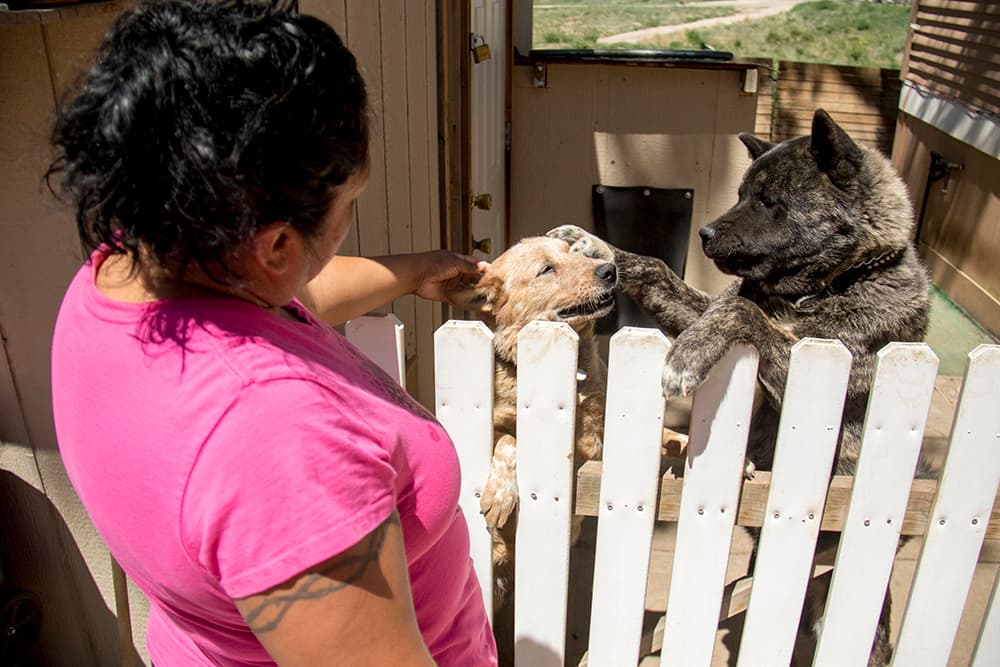
"She never imagined that we would know about the hearing," Tovar said of the park manager, Faye Cline, who is the day-to-day face of ownership for park residents. "When she saw us all there, she was surprised. She realized it wasn’t just going to be her decision. You can’t just displace 100 families like that."
After the rezoning was delayed indefinitely, the rent went up -- for the second time in 2016 and the third time in two years. Lot rents vary, but many residents say they are now paying more than $800 a month when rents at nearby parks are in the $600 to $700 range. Tovar pays a surcharge for each of her four dogs, and that amount also went up.
Park residents also describe "reprisals." They said the park management is ruthless about towing vehicles, including those of guests. Tovar's 85-year-old mother is scared to visit and can't spend the night because her car will be towed, Tovar said. At one point, Tovar was told she could have four cars, and then she was told she could only have three, even though the parking pads on either side of her trailer allow for four cars. Tovar lives with her husband, Gustavo, and three of their adult children, all of whom drive.
Recently, a gas line broke at Tovar's home, and after several days, the park manager sent over a handyman who was smoking and asked to borrow her husband's tools to do the job. She insisted on a certified crew. Soon after, she was ordered to tear down a storage shed she's had for years and accused of having extra people living in her home.
“She wants to have the park unoccupied so she can change the zoning,” Tovar said “A lot of people have left and abandoned their homes because of the hostility of this woman, and I think that’s what she wants, for it to be empty.”
Cline didn't want to talk about residents' allegations and said only, "I don't care who you talked to. Listen to them."
Tovar said many people don't want to move. They might need to be near the hospital because someone in the household has medical issues. They might need to be near the highway because they travel around the region for work. Their babysitter might be nearby, along with their children's school. And some people can't move. Their mobile homes are too old and won't be accepted into other parks.
But no one can make Lustigman keep the park open.
Park owner Lustigman feels he's been more than fair by giving residents two years notice and said there is nothing wrong with raising the rent when he intends to shut the park and isn't investing in any improvements. His property taxes are going up, he said, and now he has to pay his maintenance worker $10 to $12 an hour, instead of the $8 he previously paid. He also defended selling mobile homes in the park to new residents even after he announced his intention to close the park.
In a letter to park residents, the management said the park will close on June 30, 2018, regardless of any zoning changes. Chiriboga-Flor is working with residents to try to find a way to buy the park before then, but there's no existing program to tap into for financing or assistance.
Lustigman said it was insulting that residents would think they can buy the park from him, they're so broke, and then later said he'll listen to any offer. He said residents cram 10 and 12 people into their trailers and also that residents inflated their numbers at the City Council meeting to "make it look like 500 people live here." And he said the residents who are organizing want to become "millionaires" off his plans to sell. They're not entitled to anything, he said. "They don't own the land."
Lustigman blamed the residents for the park being worn down. Tovar said she'd like to plant flowers outside, but the management will charge her extra for the water if she does.
"Some people might think it’s ugly, but it’s ugly because the owner doesn’t want to put money into it," she said. "We, as people, we want a pretty place to live."
Lustigman said the park took a turn for the worse when the residents started to change. How so? I asked.
"They're mostly Spanish now," he said. "I don't have anything against Spanish people -- my daughter-in-law is Spanish -- but they don't follow the rules."
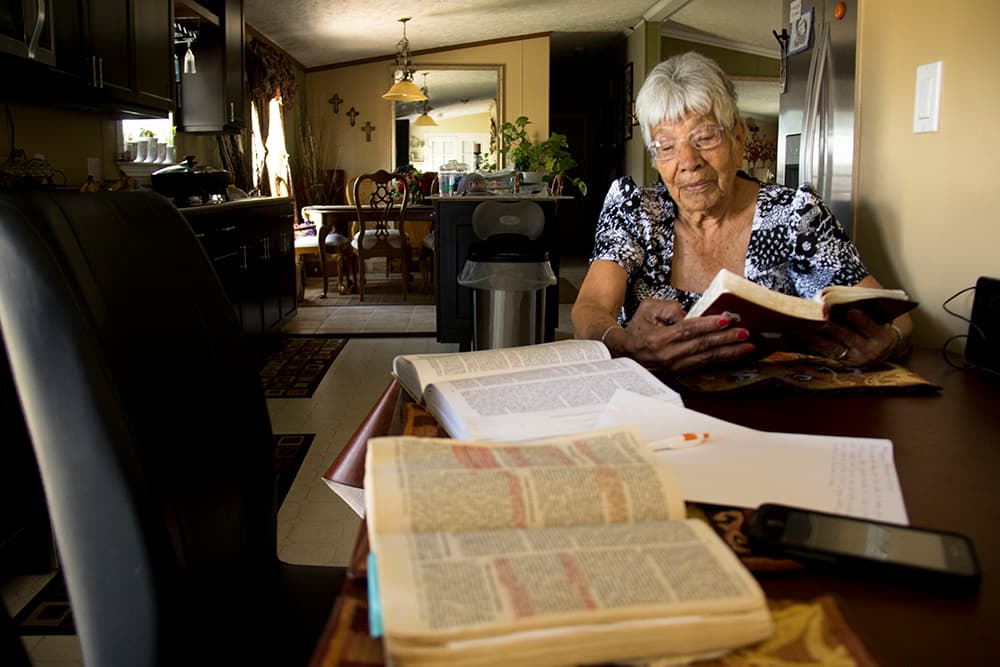
Sullivan, the professor, said there isn't good data on how market forces are affecting mobile home parks, but anecdotally, more of them are being razed, sometimes for mid-rise apartment buildings or condos, sometimes for a Walmart.
It will be very hard for government to match the level of affordability that's lost, she said.
"We can't build our way out of the affordable housing crisis," she said. "We need to keep the affordable housing that we have." Facilitating the purchase of mobile home parks by residents is "one of the major things that government could do."
"This is not just about Denver Meadows," she said. "This is about mobile home parks across this state."
